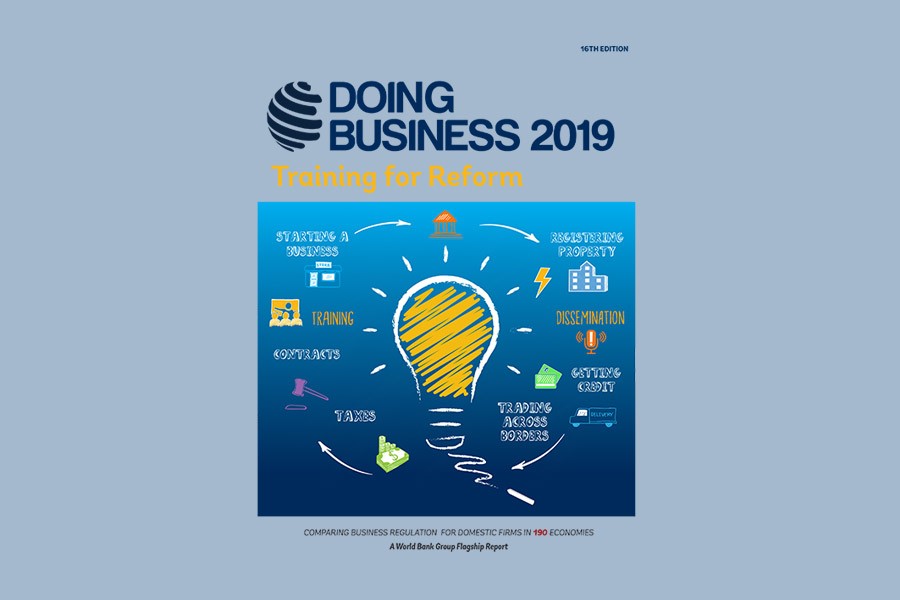Doing politics in Bangladesh seems to be an easy task. This is reflected by the number of political parties - both registered and unregistered - jostling to participate in the next general election. But doing business here is a hard nut to crack. Bangladesh continues to face a number of barriers in the world of business which negatively impacts investment so much needed for economic growth and employment generation. In other words, doing business here is very costly and discouraging.
It is true that Bangladesh duly claims a credit for its performance in the last one decade or so in various socio-economic arenas. Remember this country was once termed a "Test Case of Development" - a la Just Faaland and J. Parkinson - in the 1970s in the 'negative' sense - that is, if Bangladesh develops, then no other country in the world would remain underdeveloped. Now it is being dubbed as a test case of development in a positive sense -all developing countries should be able to drastically reduce extreme poverty as Bangladesh has shown the path of reducing poverty. For the moment, let's forget that Bangladesh has also done exceptionally well and tops the list of developing countries, given adverse natural and man-made constraints, in various socio-economic indicators.
But the findings of a recent report of the World Bank dampen the exuberance and enthusiasm existing all around. The country has been ranked 176th (out of 190 countries) in the World Bank's Ease of doing Business index this year - the lowest ranking for a South Asian nation. Finance Minister himself termed it as a "shame for the country after it lagged behind war-torn Afghanistan".
The report concentrates on 10 areas of life cycle of a business - starting a business, confronting construction permits, access to electricity, registering property through formal and informal battles, access to credit, paying taxes, enforcing contracts, international trade, resolving insolvency and protecting minority investors. Although Bangladesh has progressed one notch up compared to 2018, it scored badly in seven of the indicators. From last year there were improvements in three areas such as access to electricity, registering property and paying taxes. Comparatively speaking, India's ranking on doing business has gone up from 77 to 100, Nepal's from 100 to 110, Sri Lanka's from 100 to 111, Pakistan's from 136 to 147, and even of a war-ravaged Afghanistan lifted its score from 167 to 183.
It would, however, be a mistake to assume that Bangladesh has done nothing on this font. In fact, it has adopted a number of pro-business policies but the commitment was weak and implementation was at snail's pace.
Improvement (or deterioration thereof) in the factors that fuel business have a number of economic implications which has relevance with Professor Selim Raihan's following observations (paraphrased). Despite the gradual rise in the investment-GDP ratio over the past three decades, in recent years, the share of private investment in GDP (gross domestic product) has remained static and the share of public investment in GDP has risen. It is also found that the share of private investment in total investment has fallen whereas the share of public investment in total investment has increased. One very important aspect of the pattern of Bangladesh's investment regime in the 1990s and 2000s is that the major contribution to the rise in investment-GDP ratio came from the rise in private investment and its share in total investment. Especially, during 1995 and 2008, there was a persistent rise in the private investment- GDP ratio. Between 2009 and 2017, this ratio ?uctuated. Between 2009 and 2017, the ratio of private investment to GDP increased by only 1.2 percentage points.
Bangladesh aspires to achieve 9.0 per cent real GDP growth rate by 2030. In this case, the required investment-GDP ratio would be around 40 per cent under the assumption of a 4.44 ICOR (Incremental Capital-Output Ratio) - the average ICOR during 2013 and 2017. Under this scenario, between 2018 and 2030, the investment-GDP ratio has to be increased annually by 0.73 percentage points - 171 per cent higher than the annual average percentage points rise of 0.42 during 2013-2017.
It may be noted here that Bangladesh's investment to GDP ratio at 31 per cent at the moment stands far behind Bhutan (58 per cent), the highest in South Asia, Nepal (31 per cent), Sri Lanka (32 per), according to the recent IMF report.
The fate of a prosperous Bangladesh, nay, attainment of a middle-income country status country by 2030, very much depends on improving the environment relating to doing business.
Abdul Bayes is a former Professor of Economics at Jahangirnagar University.


